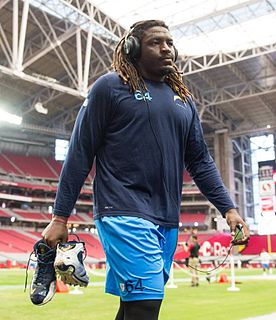A Quote by Craig Watts
This is the worst time to miss a bill. Pay down any large credit card or other large revolving accounts if you can, because high balances will hurt your credit rating. And avoid opening any other accounts before the loan you're pursuing is closed.
Related Quotes
Credit card companies are jacking up interest rates, lowering credit limits, and closing accounts - and people who have made timely payments are not exempt. So even if you pay off your balance - and that's tough when interest rates are insanely high - there's a good chance your credit limit will be slashed, and that will hurt your FICO score.
If you have credit card debt and credit card companies continue to close down the cards, what are you going to do? What are you going to do if they raise your interest rates to 32 percent? That's five times higher than what your kid is going to pay in interest on a student loan. Get rid of your credit card debt.
I have no credit cards. That was the decision that was made jointly by the credit card companies, and by me. I can't say that that was completely on my account. I buy nothing on credit now, nothing. If I can't afford it, I don't buy it. I have a debit card, that's all I have. Any debt that I have, I am paying down.
The very large units of production and exchange have access to credit on a large scale, sometimes without any cover at all, merely upon the prospect of their success, and always upon terms far easier than are open to their smaller rivals. It is perhaps on this line of easier credit that large capital today does most harm to small capital, drives it out and ruins it.
Our first benchmark is to cut the deficit more quickly to safeguard Britain’s credit rating. I know that we are taking a political gamble to set this up as a measure of success. Protecting the credit rating will not be easy The pace of fiscal consolidation will be co-ordinated with monetary policy. And we will protect Britain's credit rating and international reputation.
No one anticipates divorce when they're exchanging vows, and it can be devastating emotionally and financially. To ease the financial side of the blow, you need to maintain your financial identity in your relationship. That means having your own credit history - you need your own credit card - and your own savings and retirement accounts.
A consolidation makes sense only if you can lower your overall interest rate. Many people consolidate by taking out a home equity line loan or home equity line of credit (HELOC), refinancing a mortgage, or taking out a personal loan. They then use this cheaper debt to pay off more expensive debt, most frequently credit card loans, but also auto loans, private student loans, or other debt.
In about one-third of credit card consolidations, within a short period of time, the cards come back out of the wallet, and in no time at all, they're charged back up. Then you're in an even worse position, because you have the credit card debt and the consolidation loan to worry about. You're in a hole that's twice as deep - and twice as steep.





























